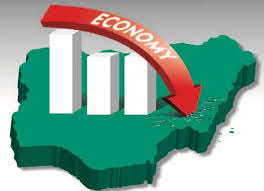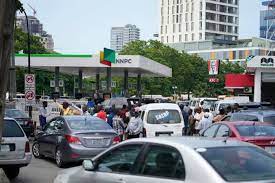The advent of the novel coronavirus and the attendant measures taken by the government to curb its spread has left many small businesses reeling; BENJAMIN UMUTEME reports.
When the federal government commenced the implementation of restriction in movement by Nigerians commonly called lockdown to curb the spread of the coronavirus pandemic on March 30, many thought it would be business as usual, but five weeks down the line nothing much seems to have changed.
In announcing an extension to the lockdown, President Buhari had warned that, “It is a matter of life and death, as the repercussions of any premature end to the lockdown action are unimaginable.”
The extension of the lockdown is expected to add to the hardship of over 80 million Nigerians living from hand-to-mouth, often on less than one dollar a day.
With the vast majority of Nigerians depending on daily wages, journalist Ahmed Idris noted that they would have to go out to get money and buy foodstuff to put it on the table for their families.
Disruption of economy
Some small businesses and workers in the private sector have continued to express concerns over the negative impacts of the lockdown which had economic activities across the country.
For business owner and major distributor of plastic chairs, Mr. Ayooluwa Shoga, the lockdown has created an unprecedented situation for most businesses.
He said many businesses had been caught unawares, noting that this was so, especially in Nigeria where initial plans and strategies made at the beginning of the year could no longer be followed through.
“The pandemic has caused major disruption of the normal flow of business processes in view of the need for social distancing in order to curb the spread of the virus. Regardless of the fact that the lockdown is intended to curb the spread of the virus, miscellaneous expenses are still being incurred, wages still have to be paid, rent has not stopped, and interest on bank loans is still being charged.
“However, little or no revenue is being made at this time. So, this is a particularly challenging period for businesses. If the virus-induced lockdown tarries further, owners of businesses will be forced to take hard decisions like laying off staff, rolling back on expansion and renegotiating contracts or existing loans,” he said.
Also, Mr. Opeyemi Oretuyi, a media strategist, said this was a challenging period for the country, noting that the outbreak was crippling the Nigerian economy as most companies could no longer operate at full capacity.
He said by asking people to stay at home, the government hoped to slow and reverse the rate at which the Covid-19 virus was spreading. Oretuyi, however, said the outbreak had not only affected big companies and businesses but also petty traders who hawked on a daily basis to put food on the table for their families.
“It is really a scary situation that no country planned for and as much as the coronavirus induced lockdown is affecting businesses, I think it is safe to adhere to the directives given by the government so that we can curb the spread of the virus,” he said.
Easing the lockdown
With a month gone and no end in sight to the spread of the virus, the president was left with no choice than to ease the lockdown with directives on the dos and don’ts for those that would be go out to conduct their businesses.
He said, “The lockdowns have also come at a very heavy economic cost. Many of our citizens have lost their means of livelihoods. Many businesses have also shut down. No country can afford the full impact of a sustained lockdown while awaiting the development of vaccines or cures.
“In my last address, I mentioned the federal government will develop strategies and policies that will protect lives while preserving livelihoods. In these two weeks, the federal and state governments have jointly and collaboratively worked hard on how to balance the need to protect health, while also preserving livelihoods, leveraging global best practice while keeping in mind our peculiar circumstances.
“We looked at how our factories, markets, traders and transporters can continue to function while at the same time adhering to the NCDC guidelines on hygiene and social distancing. We assessed how our children can continue to learn without compromising their health.
“We reviewed how our farmers can safely plant and harvest in this rainy season to ensure our food security is not compromised. Furthermore, we also discussed how to safely transport food items from rural production areas to industrial processing zones and ultimately, to the key consumption centers. Our goal was to develop implementable policies that will ensure our economy continues to function while still maintaining our aggressive response to the Covid-19. These same difficult decisions are being faced by leaders around the world.”
Spike in food prices
As small businesses who make up 75 per cent of businesses in the country are unable to go out or travel across states to restock or get needed supplies, it led to a spike in price of goods and services especially food items.
For a trader in Jikwoyi, who simply identified herself as Dorcas, the inability of people to travel to sources of supply to buy goods is responsible for the rise in the price of food items.
According to her, many wholesalers who had stocked their stores took advantage the lockdown to increase their prices.
She said, “It has been difficult for us to do business properly since the lockdown started and even now that it is over, the prices of goods have gone up. The people we buy from say they have to increase the price they sell to us because they now spend more to bring in their goods.”
When told that the price they sell is equally high, she told our correspondent that “the amount I buy determines how I sell my goods.”
Checks by own correspondent revealed that a price of rise that was N18, 000 before the lockdown now goes for N22, 000. A 25 litres of Kings Groundnut oil that was sold for N11, 000 moved to N15, 000, the same with a mudu of graduated sugar now going for N800 as against N500 pre-lockdown.
Even the price of bread a key staple food in the Nigerian diet as the lockdown efforts to contain the novel coronavirus spread has risen also.
Master Bakers Association says the situation has forced bakers across the country to increases all sizes of bread by N50.
“The price of bread has gone up owing to the increase in all our inputs prices amid the lockdown,” Jude Okafor, the national secretary, Association of Master Bakers and Caterers of Nigeria, said. Prices of butter, preservatives, sugar, and flour have all increased. A 50kg bag of sugar we normally buy for N13, 500 before the lockdown is now sold for N18, 500,” he said.
He noted that bakers were forced to increase the prices of their bread despite the economic situation in the country.
He stated that bakers have been operating below their production capacity since 2018 when consumer purchasing power has been on the decline.
“We have since slowed down our production because Nigerians are not consuming bread-like before. Most of us are just operating to still remain in business,” he said.
For bread seller, Usual, the increase in price of bread has led to the loss of some customers. She told Blueprint Weekend that before the lockdown, the popular ‘Easybite’ was sold for N350 but with the lockdown and days after it was eased in the federal capital territory; the price has yet to come down. According to her, it was difficult before the lockdown, but with this, sales have dropped drastically.
“Before the lockdown, we were having problem with selling what we buy every day, however, with the lockdown and even now, we have lost many customers. One of my most loyal customers now buys bread twice a week instead of everyday like he used to do. When I asked him why he reduced the number of times he now buys bread, he told me that business has slowed down and that he is not comfortable with the new price of N400.”




